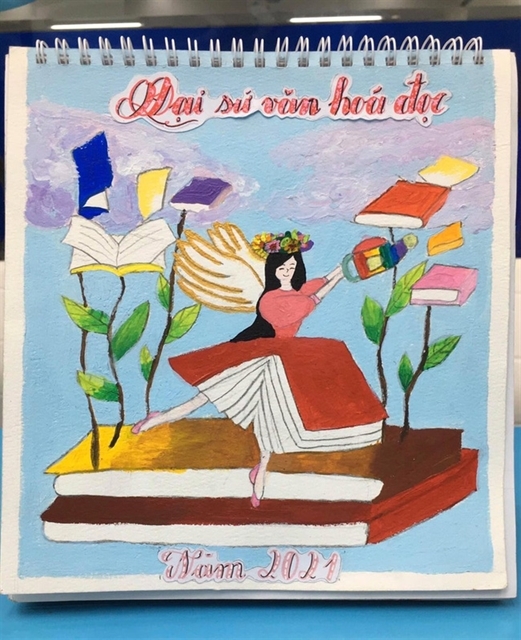 |
|
A student drawing promotes the Reading Cultural Ambassador Contest 2021. Photo courtesy of contest organisers. |
Despite the impact of the coronavirus pandemic, the contest launched by the Ministry of Culture, Sports and Tourism in February is now entering the preliminary round. The competition is widely seen as playing a key role in helping the younger Vietnamese generation in developing a healthy reading culture.
Organisers are currently busy collecting entries and preparing the grading and selection process.
Lâm's 3,800-word entry is one among hundreds of thousands from young people across the country who have a deep love of reading.
In his submission, Lâm explores questions relating to effective reading methods, the development of life skills as well as how to encourage people to read more.
Through his writing, he wants to show that books are cultural products and an endless treasure trove of human knowledge.
“Reading books will help people review the experiences and thoughts accumulated by mankind over thousands of years,” Lâm says.
“Books are tools recording people's intellectual understanding in all fields of life, such as people, social sciences, and natural sciences. They store the spiritual heritage of man and can give valuable lessons that people in the past worked hard to obtain," he writes in his submission.
Lâm believes that our reading choices should be informed by what we need, not merely what we have.
"Of course, you should choose books that are appropriate for your age and interests,” he says. “Stay away from evil books because bad books are like bad friends, sooner or later they will infect you with bad habits."
If he wins the competition, Lâm plans to encourage people to read more books.
"There is a saying 'a house without books is like a body without a soul'. Thus I will spread my love of books to as many people as possible,” he writes.
“I will try to encourage reading in the community as a way to contribute to the formation of human character and help people improve their knowledge."
Candidates across the country are still sending their submissions, and the number of entries has increased to a record high.
The preliminary round attracted hundreds of thousands of entries. Hà Nam has had nearly 50,000 submissions, Quảng Ninh over 47,000, the Central Highlands province of Gia Lai nearly 30,000, the central province of Phú Yên 11,000, and Bình Dương nearly 8,000.
Contestants this year have been carefully invested in not only the content but also design, with many submissions beautifully decorated.
The Ministry of Culture, Sports and Tourism said it had issued organising guidance with the aim of inspiring passion for reading among youth and creating a reading culture within the wider community.
In recent years, the government has aimed to create a greater reading culture among young people, with a wide range of related activities being held.
The contest is seen as part of the toolkit to implement the Government's national project on developing reading culture over the next 10 years.
Phạm Quốc Hùng, director of the culture ministry's Library Department and member of the contest organising board, said the competition played a vital role in developing reading and helping people, especially students, to access information, raise their intellectual level and be more creative.
He ambitiously believes the contest will also help people enhance their general knowledge, ensure a healthy lifestyle for the younger generation and encourage a learning society.
Chu Thị Thu Hằng, editor-in-chief of Văn Hóa (Culture) newspaper – which is also part of the contest – has suggested improving the quality of the contest.
“As the contest is a very meaningful national event and from the perspective of a member of the organising board, it is necessary to communicate the specific activities of the competition in a detailed manner,” she said.
The Văn Hóa newspaper has designed a banner on its homepage leading to further information on the contest.
The 2020 Reading Culture Ambassador Contest has attracted more than 1 million students and pupils, with as many as 5,376 educational institutions participating.
Through their entries, candidates not only gave practical ideas encouraging people to read more, but also developed reading plans for themselves.
The event concluded with eight first prizes, 16 second prizes, 52 third prizes, and 180 consolation prizes.
Based on these successful results, the Ministry of Culture, Sports and Tourism issued a plan for the organisation of the 2021 version early this year.
The contest is conducted over two rounds, with the preliminary one launched in provinces and cities, higher education institutions and the Việt Nam Education Publishing House from February to July 31.
For the final round, entries will be submitted to the organising board before August 5. The awards presentation will be held by the end of October.
Source: VNS